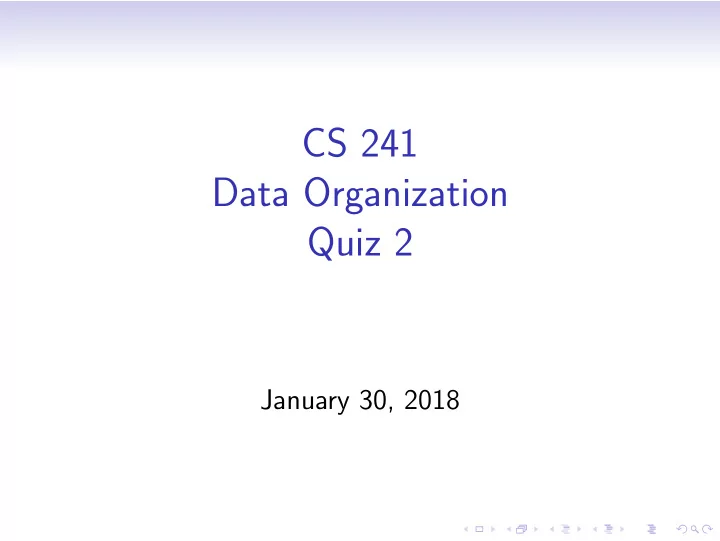

CS 241 Data Organization Quiz 2 January 30, 2018
Question 1: Syntax Which of these statements would result in an error? A int a = (float) 3 / (float) 4; B int b = (int) ’c’; C int c = 1/2 + 1/3 + 1/4 + 1/5 D int d = (5 - 2) > 3; E int e = 5%17;
Question 1: Syntax Which of these statements would result in an error? A int a = (float) 3 / (float) 4; B int b = (int) ’c’; C int c = 1/2 + 1/3 + 1/4 + 1/5 D int d = (5 - 2) > 3; E int e = 5%17;
Question 2: ‘=’ symbol In the C programming language, the ‘ = ’ symbol is most accurately read: A “Equals” B “Variable Assignment” C “Is equivalent to” D “A mathematical symbol used to indicate equality” E “A conditional symbol used to indicate equality”
Question 2: ‘=’ symbol In the C programming language, the ‘ = ’ symbol is most accurately read: A “Equals” B “Variable Assignment” C “Is equivalent to” D “A mathematical symbol used to indicate equality” E “A conditional symbol used to indicate equality”
Question 3: Call by value In the C Programming Language, call by value means: A When two functions have the same name, the compiler determines which to call by the value of the arguments. B When calling a function, the called function is given the address of its arguments so that the function can both read and set the arguments values. C Each called function is assigned a value that is used by the operating system to determine the functions priority. This is most useful on multi-core systems. D When calling a function, the called function is given the values of its arguments, copied into temporary variables. E Before a function is evaluated, the arguments are substituted directly into the function. Only when the function is evaluated, then the function evaluates the values.
Question 3: Call by value In the C Programming Language, call by value means: A When two functions have the same name, the compiler determines which to call by the value of the arguments. B When calling a function, the called function is given the address of its arguments so that the function can both read and set the arguments values. C Each called function is assigned a value that is used by the operating system to determine the functions priority. This is most useful on multi-core systems. D When calling a function, the called function is given the values of its arguments, copied into temporary variables. E Before a function is evaluated, the arguments are substituted directly into the function. Only when the function is evaluated, then the function evaluates the values.
Question 4: if, else if, else What is the output of this code? int main(void ){ int x = 10; A x is 10 if (x == 10) B x is 10 x is 2 x is 2 { printf("x is 10\n"); C x is 10 x is 10 } else if (x = 2); D x is 10 x is 2 x is 10 { printf("x is 2\n"); } printf("x is %d\n", x); return 0; }
Question 4: if, else if, else What is the output of this code? int main(void ){ int x = 10; A x is 10 if (x == 10) B x is 10 x is 2 x is 2 { printf("x is 10\n"); C x is 10 x is 10 } else if (x = 2); D x is 10 x is 2 x is 10 { printf("x is 2\n"); } printf("x is %d\n", x); return 0; }
Recommend
More recommend